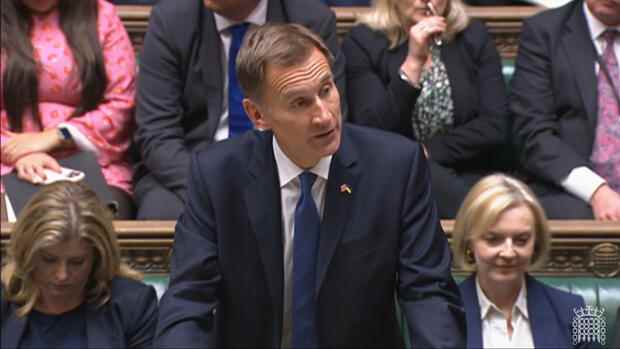Jeremy Hunt (M), UK Treasury Secretary, speaks in the UK House of Commons. Prime Minister Liz Truss (right) listens in silence.
(Photo: dpa)
London In the summer, Jeremy Hunt had actually already buried his political ambitions. The 55-year-old from the conservative faction received only 18 votes in the race to succeed Boris Johnson as party leader and prime minister. That was the worst result of all candidates.
This is probably one of the reasons why Hunt thought last Friday that he couldn’t believe his ears: when British Prime Minister Liz Truss wanted to speak to him while he was on vacation in Belgium, he initially thought it was a bad joke. This is how the British media report it.
When the politically ailing head of government then offered him the job of finance minister, Hunt first needed some time to think things over, they say. After all, after his own resignation in the race for party leadership, he had not supported Truss, but their fiercest rival Rishi Sunak.
In the end, Hunt accepted the Prime Minister’s surprise offer, boarded the Eurostar to London and, as of Friday afternoon, is Britain’s most powerful politician.
Top jobs of the day
Find the best jobs now and
be notified by email.
No one knows exactly what conditions the Tory Truss, who belongs to the moderate wing of the party, made for his commitment. At the latest since Hunt on Monday buried the Prime Minister’s agenda of tax cuts on credit, known under the label “Trussonomics”, with a clear cut, hardly anyone in London doubts that it is now he and not her who is responsible for her numerous mistakes and political turning manoeuvres discredited Truss holds power.
According to analysts, Hunt’s quick and decisive action initially succeeded in calming the financial markets, which had become nervous as a result of the prime minister’s fiscal policy false start.
British Treasury Secretary Jeremy Hunt leaves his home in London.
(Photo: Reuters)
Yields on UK government bonds have fallen and the pound has rallied in the currency markets. “Better late than never,” said Benjamin Nabarro, chief economist at the US bank Citigroup in London, welcoming Hunt’s about-face towards a more solid financial policy.
At his first appearance as finance minister in the British Parliament on Monday, the new finance minister confidently made it clear that he intends to continue the change of course. Hunt trimmed the prime minister’s energy aid, hinted at cuts in social spending, questioned the inflation adjustment of pensions and did not want to rule out another special tax on the energy companies’ profits from the crisis.
Meanwhile, Truss had to listen in silence as her Treasury Secretary announced measures she had categorically ruled out just a few days ago.
The mostly affable Hunt is not necessarily considered an unscrupulous power politician. Unlike the majority of his party and the Prime Minister, who also turned around on this issue, Hunt is also a “Remainer” and voted against his country’s exit from the EU.
“Jeremy Hunt, as Chancellor of the Exchequer, is someone who shares my desire for a high-growth, low-tax economy.” Liz Truss on the appointment of her new Treasury Secretary
Of the 12 years the Tories have ruled Westminster, the London-born, elite-school and Oxford-educated politician has sat at the cabinet table for nine, including six years as Health Secretary. He is best known outside the UK for his brief tenure as British Foreign Secretary in 2018/19.
Outside of politics, Hunt has amassed a considerable fortune as a shrewd businessman. Then as now, the calm, unexcited conduct of his duties is his outstanding quality. “A safe pair of hands,” say the British.
Will Hunt make the leap to the top and bid to succeed Truss?
“Jeremy Hunt as Chancellor of the Exchequer is someone who shares my desire for a high-growth, low-tax economy,” Truss said, explaining her surprising choice. But that’s only partly true: It’s true that the new finance minister also believes that low corporate taxes ensure economic growth. And during the summer, Hunt also advocated cutting corporate income tax from 19 percent to 15 percent.
But now he wants to increase it from 19 to 25 percent. According to the new treasurer, there will only be tax cuts when the economic situation allows it. The financial markets leave him no other choice.
It will probably already become clear at the end of October whether, with this premise in the Conservative Party, which is committed to low taxes, he can even be considered as the successor to the head of government, who can hardly be retained. Then Hunt wants to present his first budget and is dependent on the support of his divided faction for the austerity measures that will follow.
He himself rejects higher ambitions. Neither his wife nor his three children would like to see him at 10 Downing Street, says Hunt. However, experience shows that a surprising phone call could change his mind.
More: Treasury Secretary Hunt kills Prime Minister Truss’s agenda as markets react positively
